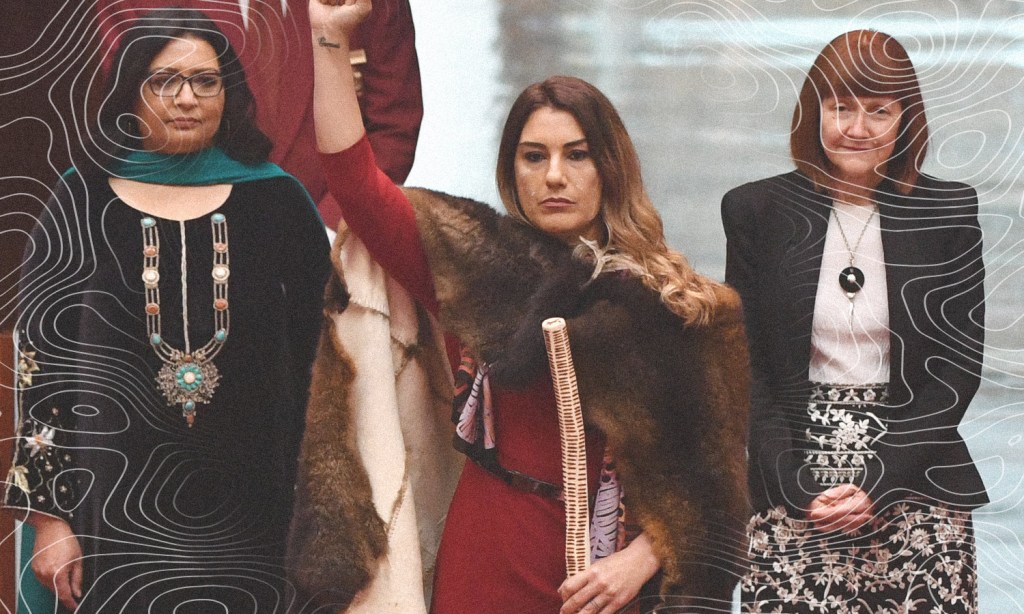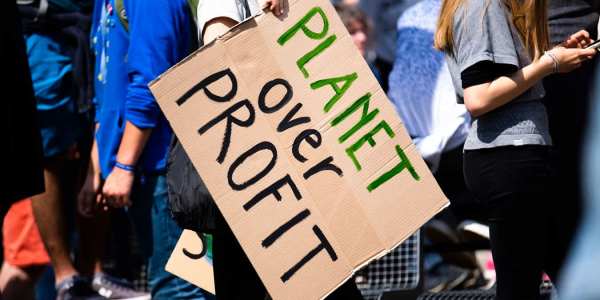Lidia Thorpe has followed up on her shock exit from the Greens by revealing that she may form a new ‘Blak Sovereignty’ political party. Thrope dropped one of the biggest bombshells in politics on Monday, by announcing that she would be departing the Greens to serve as an independent senator and the leader of the ‘Blak Sovereign Movement’.
“This country has a strong grassroots Blak Sovereign Movement, full of staunch and committed warriors, and I want to represent that movement fully in Parliament,” Thorpe said.
“It has become clear to me that I can’t do that from within the Greens. Now I will be able to speak freely on all issues from a Sovereign perspective without being constrained by portfolios and agreed party positions”.
Speaking to The Guardian on Thursday, the DjabWurrung Gunnai Gunditjmara Senator for Victoria said that we need “a Blak sovereign movement in this country.”
On the upcoming Voice to Parliament referendum, which prompted her departure from her long-time party, she said it would “hurt us either way: yes or no.”
“It’s already hurting us – it’s creating so many divisions, black fellas are like ‘Oh, I want to say I don’t like this, but I’m scared to say what I like – I don’t understand it.’
“It won’t be our decision – it’s the white people who decide for us.”
Thorpe’s break with the Greens has caused something of a headache for the party, which has not only lost its First Nations spokesperson but also defended her during a relationship scandal last year. It has also deepened some rifts within the party over the Voice and its implementation.
Greens leader Adam Bandt said that Thrope has made “a phenomenal contribution” and that he is “sad to see her go.”
“The Greens will continue to work closely with Senator Thorpe on a range of issues, and I thank her for committing to vote with the Greens on climate,” he said in a statement.
Within hours of her announced departure, the party came out in full support of a First Nations Voice to Parliament referendum, something of a sticking point for Thorpe, who said that she could not support the Voice without having a Treaty with First Nations people in place beforehand.
“The Greens still strongly believe that a Treaty should come first. We have secured commitments from the government that they will proceed with Truth and Treaty as well as Voice, and we will be holding the government to account on this,” Bandt said.
“I don’t think a ‘No’ vote will get us closer to Treaty and Truth, but I respect that others in the First Nations community may have a different view on that”.
However, since that announcement, the Green’s First Nations advisory group issued a statement savaging the Voice and the referendum. They claim that it’s “not necessary” to stir up the whole nation over an idea that won’t even grant self-determination rights as outlined in the UN Declaration of the Rights of Indigenous People.
With this all being said, what exactly are Thorpe’s next steps? What is the Blak Sovereignty Movement, and how much support does it actually have in Australia? Here’s what you need to know.
Blak Sovereignty
The term ‘sovereignty’ means the ability to self-govern. It defines a nation, or a people, or an entity, as being self-regulating, self-ruling, and independent from the laws and regulations of others. It’s wrapped up in concepts of hierarchy, power, and, typically, land and the right to rule over or protect that land.
In international political theory, sovereignty is either granted or taken — it is not inherent to a group, body, or organisation unless recognised by other sovereign entities. It’s also why people acting on sovereign authority — the army, for example – don’t go trampling over the sovereign territory of another power. This is because doing so would be an infringement of another group’s sovereignty. Sovereignty only works if everyone playing the sovereignty game recognises it as such.
Australia, as a national sovereign entity, currently does not recognise the sovereignty of Indigenous peoples. This stems from the historic injustice committed by Britain when it raised the flag in Sydney Cove in 1788 and proclaimed the territory as part of the British Empire.
This is why the phrase “sovereignty was never ceded” is so popular amongst Indigenous activists and their allies as it’s a reminder that the authority to rule over the land was never granted to Britain, and subsequently Australia, by those who ought to have had their sovereignty over it recognised, the Traditional Custodians.
Therefore, Blak Sovereignty is the concept that First Nations peoples should have ultimate and supreme authority over their own livelihoods and decision-making within this land.
While it has been portrayed as a ‘radical’ concept, it has a long and accepted legal precedent. The aforementioned UN Declaration on the Rights of Indigenous People, adopted by the convention in 2007 and drafted with the assistance of Aboriginal and Torres Strait Island peoples, partially affirms the idea.
It declares that Indigenous people “have the right of self-determination,” “have the right to autonomy or self-government,” and “have the right to maintain and strengthen their distinct political, legal, economic, social and cultural institutions.”
However, it also explicitly states that no group can “dismember or impair totally or in part, the territorial integrity or political unity of sovereign and independent States”.
Australia is a signatory to this Declaration, and yet Indigenous leaders have claimed that the government has not fully implemented its implications. This is in spite of the fact that, for the majority of the state’s history, our legal system has recognised its own incoherence in its relation to Indigenous peoples.
In 1841, a NSW Supreme Court ruling over the murder of an Indigenous man found that Aboriginal peoples are sovereign in their own right and that Europeans are intruders on their land. At the time, Judge J Willis said that the colonists, not the First Nations peoples, were foreigners.
“The former are exotics, the latter indigenous, the latter the native sovereigns of the soil, the former uninvited intruders,” Willis said.
Later, in 1992, the case of Eddie Mabo vs Queensland ruled that the concept of ‘Terra Nullius’ was flawed and that Australia, rather than being an empty land justified in its capture by Britain, rightfully belonged to Indigenous peoples. Native title was therefore granted to Indigenous peoples on land where that title hadn’t been claimed.
Both of these instances are pointed to by proponents of Blak Sovereignty, who say that Australia, as it stands, is not a legitimate entity and that Indigenous people ought to have far more say in how the land that they have looked after for tens of thousands of years should be used.
Thrope, in a conversation with Junkee last year, said that the creation of a ‘Blak Republic’ is her ultimate goal for Indigenous people.
“We need Blak people, First Nations people in this country to be in the driver’s seat so that we are self-determining in a way that we have for so long,” she said.
“What does a Blak Republic look like? … Treaty, we need a Treaty before we have a Republic”.
In her eyes, the invasion and the conflict of colonisation have not ended. This is because Australia has never signed a treaty with its First Nations peoples, making it one of the only colonial nations to never have done so. Until that point, Indigenous peoples are stuck in a limbo, without self-determination and without recognition from the state.
This is reflected in the words of Willis, who said: “Aboriginal tribes are neither a conquered people, nor have tacitly acquiesced in the supremacy of the settlers.”
The Uluru Statement from The Heart recommends Voice, Treaty, then Truth as three necessarily sequential changes for reconciliation. The Greens’ policy was for Truth, Treaty, and then Voice, however, they have since changed their minds.
The Government is hoping to get the Voice through Parliament first as it seems the least controversial and the most straightforward. Thorpe clearly doesn’t support this order of policy. She fears it will mean submitting to the sovereignty of the state if the Voice is enacted before a Treaty is established.
However, the Greens have said they’ve had a guarantee from Labor that the Voice will not affect Indigenous sovereignty and that Treaty and Truth will be pursued following its implementation.
“Treaty is so important because we don’t want to cede our sovereignty. We have maintained our sovereign status in our own country since forever. We are not about to cede our sovereignty,” Thorpe said last year.
As for who exactly makes up the Blak Sovereignty movement, Thorpe has identified experts like the lawyer Irene Watson, the academic Chelsea Watego, and the writer Ronnie Gorrie.
“It’s not about me,” she said. “It’s about a movement that hasn’t been represented. We’re organised. Very organised … I’ve never seen a movement so organised.”
When asked whether or not she will form a new Blak Sovereign party to channel the aims of the movement, Thrope didn’t rule it out, saying that the next phase will look like “what the Blak sovereign movement tells me that it looks like.”
Related: The 14 Best Indigenous Artists and Activists You Need to Follow
Related: A First Nations Voice to Parliament: What Exactly Are We Voting For?
Read more stories from The Latch and subscribe to our email newsletter.







